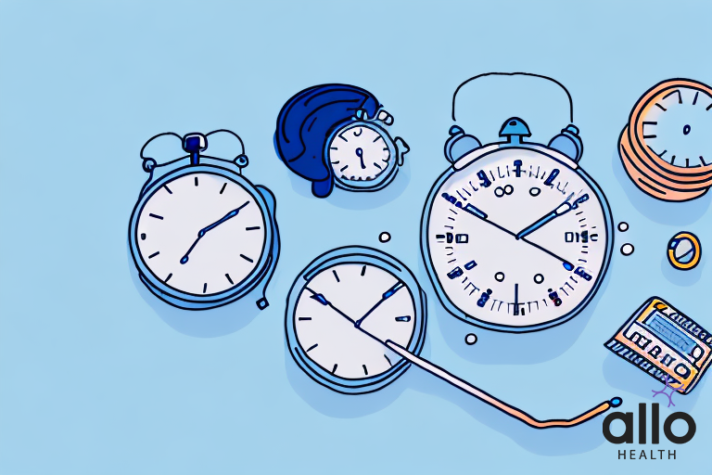How to Retard Ejaculation?

Allo Health is dedicated to personalized well-being, offering support and trusted information tailored to individual health goals. The platform emphasizes human-generated content, led by a distinguished medical team of experts, including physicians and sexual health specialists. Their commitment to credibility involves rigorous fact-checking, authoritative research, and continuous updates to ensure accurate, up-to-date information. Allo Health's unique approach goes beyond conventional platforms, providing expert-led insights and a continuous commitment to excellence, with user feedback playing a crucial role in shaping the platform's authoritative voice.

Dr. Aditi completed her undergraduate medical education at AJIMS, Mangalore, after which she worked in multi-speciality hospitals with COVID patients and in the Pain and Palliative medicine department. Driven by her experiences, she developed a keen interest in psychiatry. Dr. Aditi believes that mental health is just as, if not more important, than physical health.
Why This Was Upated?
Our experts continually monitor the health and wellness space, and we update our articles when new information became available.
Updated on 04 June, 2024
- Article was updated as part of our commitment to diversity, equity, and inclusion.

"The following blog article provides general information and insights on various topics. However, it is important to note that the information presented is not intended as professional advice in any specific field or area. The content of this blog is for general educational and informational purposes only.
Book consultation
The content should not be interpreted as endorsement, recommendation, or guarantee of any product, service, or information mentioned. Readers are solely responsible for the decisions and actions they take based on the information provided in this blog. It is essential to exercise individual judgment, critical thinking, and personal responsibility when applying or implementing any information or suggestions discussed in the blog."
Premature ejaculation is a common sexual concern that affects many individuals. It is characterised by the inability to control ejaculation, leading to a shorter-than-desired duration of sexual activity. Understanding the causes, symptoms, and available treatment options for premature ejaculation is crucial for those seeking effective solutions.
What is Premature Ejaculation?
Premature ejaculation refers to a sexual condition where a person ejaculates sooner than they or their partner would like during sexual intercourse. This can lead to distress and dissatisfaction for both individuals involved.
Signs of Premature Ejaculation
- Ejaculation occurring within one minute of penetration on a consistent basis.
- Difficulty controlling the timing of ejaculation during sexual activity.
- Feelings of frustration, embarrassment, or distress related to the rapid climax.
- Avoidance of sexual intimacy or relationship strain due to concerns about premature ejaculation.
- Reduced sexual satisfaction for both partners.
These signs may indicate the presence of premature ejaculation, and seeking professional advice can provide guidance on effective management and treatment options.
Causes of Premature Ejaculation
Psychological Factors:
- Anxiety, stress, or performance pressure.
- Past sexual experiences or trauma.
- Relationship issues or conflicts.
- Depression or other mental health conditions.
Biological Factors:
- Abnormal hormone levels.
- Inherited traits or genetic predisposition.
- Conditions affecting the prostate or thyroid.
Erectile Dysfunction:
- Difficulty in achieving or maintaining an erection.
- Resulting anxiety about sexual performance.
Nervous System Issues:
- Conditions like multiple sclerosis or neuropathy.
- Disruption in the signals between the brain and genital area.
Medication and Substance Use:
- Certain medications, such as antidepressants.
- Substance abuse, including alcohol or recreational drugs.
Overstimulation:
Infrequent sexual activity, leading to heightened sensitivity.
Medical Conditions:
- High blood pressure or heart disease.
- Conditions affecting the urinary system.
Understanding these potential causes can aid in identifying appropriate treatment strategies for premature ejaculation. Consulting a healthcare provider is advised for personalised guidance and support.

How to Retard Premature Ejaculation?
- Practice Kegel Exercises: Strengthening pelvic floor muscles through Kegel exercises can help improve ejaculatory control.
- Masturbation Techniques: Engage in self-pleasure with a focus on delaying climax to build endurance.
- Deep Breathing and Relaxation Techniques: Control arousal through slow, deep breaths and relaxation exercises.
- Mindful Masturbation: Pay attention to sensations and practice controlling arousal during solo activities.
- Utilise Desensitising Products: Topical products like numbing sprays or condoms can reduce sensitivity.
- Experiment with Different Positions: Some positions may allow for better control over arousal and ejaculation.
- Limit Anxiety and Stress: Employ stress-reducing techniques like meditation or yoga to alleviate performance anxiety.
- Open Communication: Discuss concerns with your partner to reduce pressure and enhance mutual understanding.
- Seek Professional Help: Consulting a healthcare provider or sex therapist can provide specialised guidance and treatments.
Treatment Options for Premature Ejaculation
- Cognitive-Behavioral Therapy (CBT): CBT is a type of psychotherapy that focuses on identifying and changing negative thought patterns and behaviors. In the context of premature ejaculation, CBT helps address any psychological factors that may be contributing to the issue. This could include performance anxiety, self-esteem issues, or relationship concerns.
- Sex Therapy: Sex therapy is a form of counseling or psychotherapy that specifically addresses sexual concerns and dysfunctions. It involves open communication between partners and may include exercises to improve intimacy and trust. Sex therapists work with couples to enhance their sexual experiences and overcome challenges.
- Topical Anesthetics: Topical anesthetics are creams, gels, or sprays that contain numbing agents like lidocaine or prilocaine. When applied to the penis, they temporarily desensitize the area, which can delay ejaculation. It’s important to use these products under the guidance of a healthcare provider to ensure safe and effective application.
- Phosphodiesterase-5 (PDE5) Inhibitors: PDE5 inhibitors, such as sildenafil (commonly known as Viagra), are primarily used to treat erectile dysfunction. However, some studies suggest that they may also have a positive effect on ejaculatory control. These medications work by increasing blood flow to the penis, which can potentially help in maintaining erections longer and delaying ejaculation.
- Selective Serotonin Reuptake Inhibitors (SSRIs): SSRIs are a class of antidepressant medications commonly used to treat conditions like depression and anxiety. Some SSRIs, such as dapoxetine, have been specifically approved for the treatment of premature ejaculation. These medications increase the levels of serotonin in the brain, which can have a delaying effect on ejaculation.
- Pelvic Floor Exercises (Kegels): Kegel exercises involve contracting and relaxing the pelvic floor muscles, which are responsible for controlling ejaculation. Regularly practicing these exercises can lead to improved ejaculatory control. It’s important to learn how to do Kegels correctly to get the full benefit.
- Combination Therapies: Combining different treatment approaches can often be more effective than using a single method alone. For example, a combination of behavioural techniques, medication, and/or topical treatments may provide better results for some individuals.
- Psychological Counselling: Psychological counselling involves working with a mental health professional to address any underlying emotional or psychological factors that may be contributing to premature ejaculation. This can include exploring issues related to anxiety, stress, self-esteem, or relationship dynamics.
- Lifestyle Modifications: Lifestyle changes, such as managing stress, engaging in regular physical exercise, maintaining a balanced diet, and getting adequate sleep, can positively impact overall sexual health. These changes can contribute to improved sexual function and well-being.

It’s crucial to consult with a healthcare professional or a specialised sexual health expert before initiating any treatment for premature ejaculation. They can provide personalised recommendations based on an individual’s specific circumstances, medical history, and preferences.
They can monitor progress and make adjustments as needed to ensure the chosen treatment is effective and safe.
Key Takeaways
- Premature ejaculation is characterised by ejaculating sooner than desired during intercourse, causing distress for both partners.
- Symptoms: Rapid climax within one minute, difficulty controlling timing, distress, avoidance of intimacy, reduced satisfaction.
- Causes of Premature Ejaculation: Psychological factors (anxiety, trauma), biological factors (hormones, genetics), erectile dysfunction, nervous system issues, medications, overstimulation, medical conditions.
- Management Techniques: Kegel exercises, masturbation techniques, deep breathing, mindful masturbation, desensitising products, position experimentation, stress reduction, open communication, seeking professional help.
- Treatment Options: CBT, sex therapy, topical anesthetics, PDE5 inhibitors, SSRIs, pelvic floor exercises, combination therapies, psychological counselling, lifestyle modifications.
- Professional Guidance: Consultation with a healthcare provider or sexual health expert is essential for personalised treatment and ongoing monitoring.
Frequently Asked Questions
Q: How common is Premature Ejaculation?
A: Premature ejaculation is a common sexual concern affecting many individuals.
Q: What are the possible Causes of Premature Ejaculation?
A: Premature ejaculation can be caused by a variety of factors, including psychological aspects like anxiety or stress, biological factors, conditions like erectile dysfunction, and even certain medications.
Q: Can Premature Ejaculation be treated?
A: Yes, there are various treatment options available for premature ejaculation. These can range from behavioural techniques and exercises to medications and counselling. Consulting a healthcare professional is recommended to determine the most suitable approach.
Q: Is Premature Ejaculation a sign of an underlying health issue?
A: While premature ejaculation can be a standalone concern, it can also be associated with other health conditions. It’s important to consult a healthcare provider to rule out any underlying medical issues and receive appropriate treatment.
Q: Can Premature Ejaculation impact relationships?
A: Yes, premature ejaculation can potentially impact relationships. It may lead to frustration, decreased sexual satisfaction, and emotional strain for both partners. Open communication and seeking appropriate treatment can help address and manage this concern, ultimately strengthening the relationship.






































